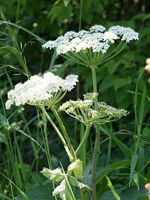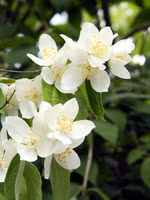Mon-Fri 9am - 5pm Mountain time
Mock Orange vs Cow Parsnip
Heracleum maximum
Philadelphus coronarius
CUSTOM GROW
NOT AVAILABLE THIS SEASON - MIGHT RETURN
Cow Parsnip is a native perennial wildflower known for its tall growth, very large leaves, and broad clusters of white flowers. The abundant blossoms provide nectar and pollen for a wide variety of pollinators, including bees and butterflies. Birds and small mammals feed on its seeds, while the foliage serves as a larval host for certain butterfly species.
Cow Parsnip is often among the first native perennials to establish in disturbed or open sites. It typically grows in moist meadows, along streambanks, forest edges, and roadsides. Although usually a short-lived perennial or biennial, it readily self-seeds and maintains strong populations where conditions are favorable.
Cow Parsnip is the only native Heracleum in North America and should not be confused with the highly invasive Giant Hogweed (H. mantegazzianum).
Note: The sap of the Cow Parsnip can cause phytodermatitis when exposed to ultraviolet light (sunlight). This can cause rashes or even burns. Care should be taken if pruning or handling this plant.
Mock Orange is an ornamental shrub known for its fragrant, white flowers. The scent is often described as orange-like with a hint of jasmine. Attractive to pollinators, hummingbirds, and humans alike.
Mock Orange is highly versatile, and can be used as an ornamental shrub, either alone or as a hedge. It is well suited for streambank stabilization and riparian zone restoration, due to its ability to grow in low, moist areas as well as those that are high and dry. Lewis Mock Orange also has the capability of being used in soil bioengineering projects such as live staking.
Cow Parsnip Quick Facts
Mock Orange Quick Facts
Toxicity: sap causes skin irritation

